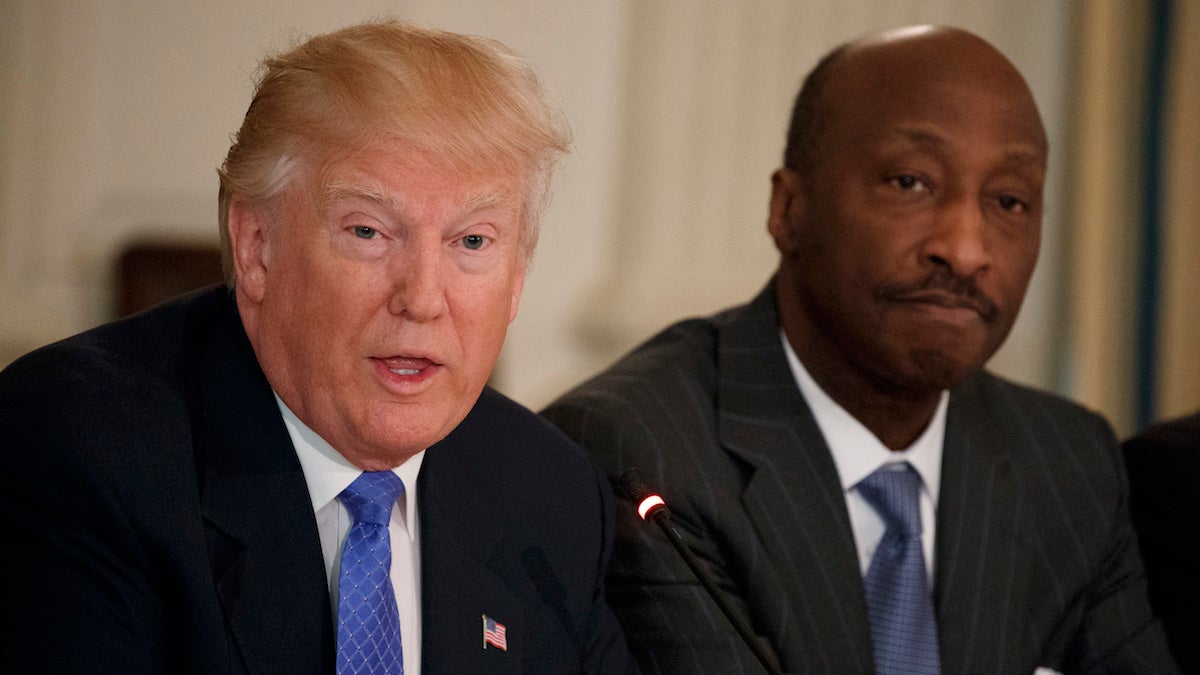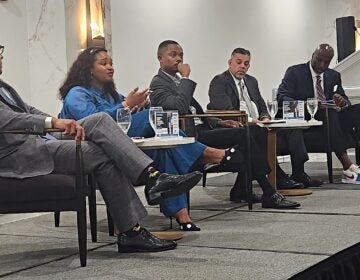Merck CEO stands against bigotry — and Trump — prompting questions of corporate responsibility

Merck CEO Kenneth Frazier listens at right as President Donald Trump speaks during a meeting with manufacturing executives at the White House in Washington, Thursday, Feb. 23, 2017. (AP Photo/Evan Vucci)
After deadly violence erupted at a white supremacy rally in Virginia last weekend, many people felt that President Trump should have more strongly denounced the neo-Nazis, Ku Klux Klan and other hate groups involved.
That included Kenneth Frazier, CEO of the pharmaceutical company Merck, who was so dissatisfied with the president’s response that he resigned Monday morning from the president’s American Manufacturing Council.
Charles M. Elson hopes that’s not the start of a new trend.
Elson is a corporate responsibility expert who heads the Weinberg Center for Corporate Governance at the University of Delaware.
The Weinberg Center is a nonpartisan organization — just like the American Manufacturing Council. That’s why Elson was disappointed to hear Frazier “take a political stand” by quitting a council intended to keep jobs in this country and build up U.S. manufacturing.
“A corporate leader’s responsibility is to the shareholders,” Elson said. “What they do politically on their own time is their own business, as it is any citizen’s business. But I think that when you begin to use a platform like that to take a political stand, I just don’t think it’s a good idea.”
Frazier, a Philadelphia native and Penn State University graduate, was the only African-American member of the manufacturing council, which Trump formed in January.
Frazier’s resignation came two days after white supremacists clashed with counter-protesters in Charlottesville, Virginia, during a “Unite the Right” gathering held to protest the removal of a Confederate statue in a park. A Nazi supporter plowed his car into counter-protesters, killing one woman and injuring 19 other people. Within hours, U.S. Attorney General Jeff Sessions announced the Department of Justice would open a civil rights investigation.
But it was Trump’s short speech Saturday — condemning the “egregious display of hatred, bigotry and violence on many sides, on many sides” — that infuriated many Americans, who questioned why he couldn’t outright condemn white supremacists.
Frazier, announcing Monday morning that he would step down from his president post, said: “Our country’s strength stems from its diversity and the contributions made by men and women of different faiths, races, sexual orientations, and political beliefs. America’s leaders must honor our fundamental views by clearly rejecting expressions of hatred, bigotry and group supremacy, which run counter to the American ideal that all people are created equal.”
Trump responded within an hour, tweeting: “Now that Ken Frazier of Merck Pharma has resigned from President’s Manufacturing Council, he will have more time to LOWER RIPOFF DRUG PRICES!”
But by Monday afternoon, Trump seemed to be in damage-control mode, addressing the Charlottesville violence at an afternoon news conference at the White House.
“Racism is evil, and those who cause violence in its name are criminals and thugs, including the KKK, neo-Nazis, white supremacists, and other hate groups that are repugnant to everything we hold dear as Americans,” Trump said. “Those who spread violence in the name of bigotry strike at the very core of America.”
Frazier’s resignation wasn’t the first time Trump’s words or actions have prompted business leaders to ditch their presidential posts. After Trump decided in June to leave the Paris climate accord, Walt Disney Co. CEO Bob Iger and Tesla Motors Corp. founder Elon Musk both quit a presidential jobs panel. Uber CEO Travis Kalanick left the president’s economic advisory council in February in protest over Trump’s immigration policies.
Elson didn’t agree with those departures either.
“You may disagree with things, but frankly, the best way to change someone’s mind is being there and articulating a different position,” Elson said. “By leaving, you lose that potential completely. And it looks a little grandstanding to me. I don’t think that’s appropriate for a CEO in that position.”
Still, some applauded Frazier’s stand against intolerance. And social media erupted with a growing chorus urging others to follow Frazier’s lead.
Apple CEO Tim Cook tweeted: “We’ve seen the terror of white supremacy & racist violence before. It’s a moral issue — an affront to America. We must all stand against it.”
And three of Frazier’s colleagues on the American Manufacturing Council echoed his rejection of extremism – and followed his example, also resigning their seats.
“We are saddened by #Charlottesville. There is no place for racism or discrimination in this world. We choose love & unity,” council member and Under Armour CEO Kevin Plank said on Twitter, later tweeting that he quit the council because “Under Armour engages in innovation and sports, not politics.”
Scott Paul, president of the Alliance for American Manufacturing, quit Tuesday morning, saying, “it’s the right thing for me to do.”
Council member and Intel CEO Brian Krzanich tweeted: “There should be no hesitation in condemning hate speech or white supremacy by name. #Intel asks all our countries leadership to do the same.”
In a blog post later explaining his decision to leave the council, Krzanich wrote: “I resigned because I want to make progress, while many in Washington seem more concerned with attacking anyone who disagrees with them. We should honor – not attack – those who have stood up for equality and other cherished American values. I hope this will change, and I remain willing to serve when it does. I am not a politician. I am an engineer who has spent most of his career working in factories that manufacture the world’s most advanced devices. Yet, it is clear even to me that nearly every issue is now politicized to the point where significant progress is impossible. Promoting American manufacturing should not be a political issue.”
Denise Morrison, the CEO of Camden, New Jersey-based Campbell Soup Co., said she would retain her council seat, telling the Philadelphia Business Journal Tuesday of a need to be “active champions” on diversity.
Trump took to Twitter Tuesday morning to blast the departing council members as “grandstanders.”
“For every CEO that drops out of the Manufacturing Council, I have many to take their place!” he tweeted.
This story has been updated to include the resignations of CEOs who followed Frazier’s lead, and Trump’s response. Check back for updates, as further developments unfold.
WHYY is your source for fact-based, in-depth journalism and information. As a nonprofit organization, we rely on financial support from readers like you. Please give today.




